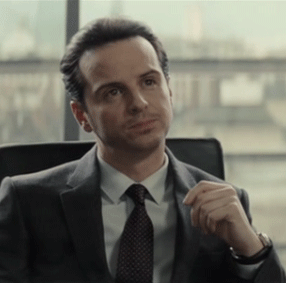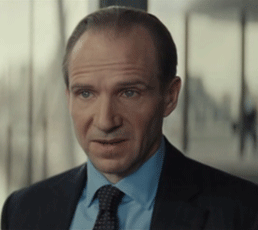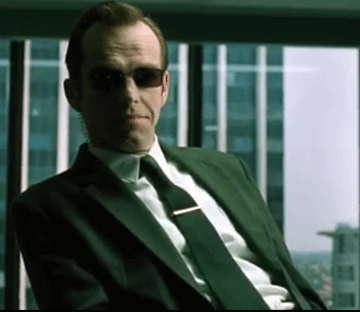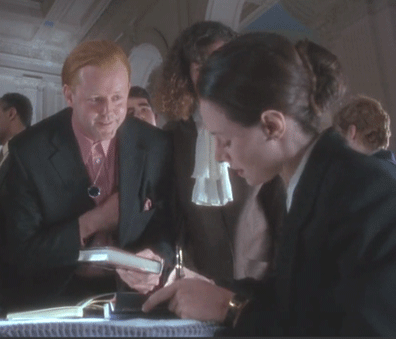
(THE SCENE: WTFN’s Los Angeles studios. The set is bedecked with selected movie posters and other accoutrements. Host Lance Boyle is sitting in his usual club chair. The opening theme music dies down.)
 |
 |
BOYLE: “In fact, Arnon Milchan, one of the producers and underwriter of The Revenant, is an admitted Israeli agent who spied on Hollywood. In a normal world, he’d have been arrested for being an agent of a foreign government, but in the U.S., which is dominated by Jewish money, he is respected. In fact he even boasted to Robert de Niro that, as an Israeli, he was proud to do what he did for his country. That included smuggling timers with a nuclear capability into Israel.”
KALE: “Indeed, and over the last 30 years or so, this pro-Israel orientation has utterly reversed the moral compass of the Western World, and Hollywood has reflected that change. With American Sniper and Zero Dark Thirty, for example, Hollywood has brutalized audiences to make them accept as normal U.S.-committed murder and the dehumanization of the enemy. To some degree, war movies have always had an element of propaganda, but now it is the U.S. that is identified with fascism and state-sponsored terrorism. To paraphrase Dr. Robert Oppenheimer: ‘We have become death, the destroyer of Muslim worlds.’ ”
BOYLE: “So, it is possible to find any relevant themes in movies?”
KALE: “Yes, but it requires audiences to make different connections than the ones the moviemakers intend. In other words, to understand the way the world is, they have to see it from the point of view of the villains. I have a couple of examples of moves that, intended or not, are valuable in this regard. Let’s start with Spectre. [SPOILER ALERT for this and other movies discussed here]
“Even though it is easily the weakest of Daniel Craig’s Bond films, it has one outstanding character—Max Denbigh, the head of MI5, the British equivalent of the FBI. His aim is to set up an total surveillance spy network beyond the control of elected governments ostensibly to protect the world against terrorism, which is the same excuse offered up to cover all manner of real-world unconstitutional abuses. The following exchange between Denbigh and Gareth Mallory, head of MI6, is the key exchange, and it comes around the hour mark. See if any of this sounds familiar. (She gesturers to an in-studio monitor):
 |
 |
||||
|
Max Denbigh
|
Gareth Mallory
|
||||
|
When it goes on line, this building will be the most sophisticated data-gathering system in history—the world’s first digital ghost, available 24/7. |
|||||
| And George Orwell’s worst nightmare. | |||||
| Glad you like it. | |||||
|
Look Max, I know surveillance is a part of life. It’s how you use the information that concerns me and who’s using it. |
|||||
|
This is what we need to do to keep people safe.…[Denbigh plays an evesdropped recording of a conversation between James Bond and Eve Moneypenny] |
|||||
| You watch MI6 agents? | |||||
| We watch everyone. | |||||
BOYLE: “I remember this scene, and I’ve heard general discussion about net neutrality, but nothing specific comes to mind.”
KALE: “Turn back to the aftermath of the Charlie Hebdo shootings of January 2015. After uttering the requisite paeans to democracy and freedom of speech, British Prime Minister David Cameron proceeded to condemn encryption and justify the government’s need for total surveillance of journalists’ private communication:
In extremis, it has been possible to read someone’s letter, to listen to someone’s call, to listen in on mobile communications. Are we going to allow a means of communications where it simply is not possible to do that? My answer to that question is: no, we must not.
BOYLE: “You’re not suggesting Denbigh was modelled after Cameron, are you?”
KALE: “No, but who knows? It’s tantalizing to think that a spy movie could be so subversively honest, but it doesn’t matter. The point is that the audience must see Denbigh not as just a movie villain but as the real face of the British government.”
BOYLE: “But if Denbigh represents current government thinking, then Cameron is a villain, and Mallory, as the voice of democracy in the movie, must be…a terrorist?!”
KALE: “By Jove I think you’ve got it!”
BOYLE: “Isn’t that a bit of a stretch?”
KALE: “Not at all. Just before Cameron made his plea for anti-terrorism totalitarianism, whistleblower Edward Snowden released proof, via certain journalists, that the British spy agency had illegally intercepted e-mails among editors and reporters at the BBC, Guardian, New York Times, Le Monde, NBC and other media outlets. Furthermore, he has now outlawed all boycott and protest of products associated with weaponry, fossil fuels, tobacco, or the illegal Israeli settlements. By any definition, Cameron is a criminal, and in a zero-sum world of good vs. evil, there is no neutral ground, so the defence of democracy against governmental excesses is itself a criminal act.”
BOYLE: “It seems that the difference between movies and real life, is that only in the movies does justice prevail.”
KALE: “That’s why villains need to be studied and respected, not reflexively hated.”
BOYLE: “Do you have any more examples of useful villains?”
KALE: “A few, but in the interests of time, I'll focus on two, but they’re connected to the theme of consumerism and despoliation of the earth. This first clip comes from one of the best movies of the last 20 years, The Matrix. As we all know, the matrix is a computer-generated reality in which people only have the illusion of independence and self-determination. Morpheus is a rebel leader trying to liberate people from their slave-like existence. The audience is, of course, supposed to identify with Morpheus and the rebels against the agents, a computer-generated program designed to root out the rebellion. Soon past the 90 minute mark, Morpheus is trapped inside the matrix and is being interrogated by Agent Smith, but Smith shows that the good/evil dichotomy between humans and machines is not so clear, as in this scene. Let’s look at the monitor.”
 I'd like to share a revelation that I've had during my time here. It came to me when I tried to classify your species. I've realized that you are not actually mammals. Every mammal on this planet instinctively develops a natural equilibrium with the surrounding environment. But you humans do not. You move to an area and you multiply and multiply until every natural resource is consumed and the only way you can survive is to spread to another area. There is another organism on this planet that follows the same pattern. Do you know what it is? A virus. Human beings are a disease, a cancer of this planet. You are a plague. And we are... the cure.—Agent Smith I'd like to share a revelation that I've had during my time here. It came to me when I tried to classify your species. I've realized that you are not actually mammals. Every mammal on this planet instinctively develops a natural equilibrium with the surrounding environment. But you humans do not. You move to an area and you multiply and multiply until every natural resource is consumed and the only way you can survive is to spread to another area. There is another organism on this planet that follows the same pattern. Do you know what it is? A virus. Human beings are a disease, a cancer of this planet. You are a plague. And we are... the cure.—Agent Smith |
KALE: “It doesn’t take much to see the truth in Smith’s rant. From the planet’s point of view, humans are indeed a disease, a cancer. But here, as with Max Denbigh, it is easy to gloss over a real-world truth when it is spoken by someone we are conditioned to dislike. The point to this powerful rant is that we humans have made our world so uninhabitable, that we abdicated our right to live our own lives.”
BOYLE: “So Morpheus and the others should accept the matrix as the price for human overconsumption?”
KALE: “The matrix is almost a perfect metaphor for our corporatized world, in which people live a servile existence, cut off from any real political power. Should we give in and accept our chains with a smile? No. Just because Smith is right about the behaviour of humans does not mean the matrix is an improvement.”
BOYLE: “What’s your other example.”
KALE: “The 1995 film 12 Monkeys, directed by Terry Gilliam. It tells the story of a man sent back to 1996 to find and stop the spread of a synthetic virus that wiped out most of mankind. The following scene takes place near the beginning at the book signing of psychiatrist Dr. Kathryn Railly. She has just given a presentation on subjects who claim to be able to predict the future, which she rationalizes away as ‘The Cassandra Complex.’
“The villain, Dr. Peters, gets in line to have his book signed and offers the following observation.” (Kale points again to the monitor.)
 |
I think, Dr. Railly, you have given your alarmists a bad name. Surely there is very real and very convincing data that the planet cannot survive the excesses of the human race: proliferation of atomic devices, uncontrolled breeding habits, the rape of the environment, the pollution of land, sea, and air. In this context, isn’t it obvious that “Chicken Little”’ represents the sane vision and that homo sapiens’ motto, “Let's go shopping” is the cry of the true lunatic? —Dr. Peters
|
KALE: “Here we not only have an indictment on the excesses of the human race, but an attack on the very economic determinism that drives our corporate matrix-like existence. People around the world are clamouring for action to protect what’s left of the environment by making the same arguments that Dr. Peters is, yet governments do nothing, and intellectual knee-cappers like Monsanto and the Koch brothers pollute the issue by sabotaging informed debate with pseudoscience.”
BOYLE: “How is Dr. Peters the villain?”
KALE: “He unleashes the virus in the name of saving the planet. Again, the audience need not approve of a man-made catastrophe to recognize that unfettered consumerism is killing the planet and to demand that governments reassert political control over their national economies in the public interest. The great value of these films is that they can inspire people to take action, but only if they are willing to take inspiration from villains.”
BOYLE: “That brings us to my favourite part of the show, The Leni Award.”
KALE: “It is perhaps the best example of propaganda in support of our reversed moral polarity. Open the envelope and see my pick for this year‘s winner” (She hands him the now familiar Oscar envelope. He opens it along the seal, and shows it to the camera.)
BOYLE: “Son of Saul, directed by László Nemes.”
KALE: “This manipulative film really pushes all the Jewish victim buttons. It takes place at the end of WWII and focuses on Saul Auslander, a Jewish Hungarian who is part of a command unit forced to lead prisoners into the gas chambers and dispose of the bodies. Saul finds a boy who expires in front of him and this compels him to search for a rabbi to perform the Jewish prayer for the dead. Meanwhile an impending escape from the camp complicates matters. This film is classic Holocaust® propaganda: there is no proof to sustain the claim of gas chambers, so the entire premise of the film is false. Second, the film fails to mention that zionist Jews were willing collaborators with the Nazis, and as I mentioned last year this is especially true in Hungary of Dr. Rudolf Kasztner.
But the real propaganda value can be found in the money behind it. The movie is funded in part by The Conference on Jewish Material Claims Against Germany, a zionist extortion racket designed to bleed Germany. The idea that Germany still has to pay for Hitler’s abuses is itself an abuse. This is Holocaust® propaganda at its finest. Congratulations, László Nemes!”
 |
BOYLE: “Well we are out of time. For Miriam Kale and the whole WTFN crew, good night.”
(Theme music and fade out)
